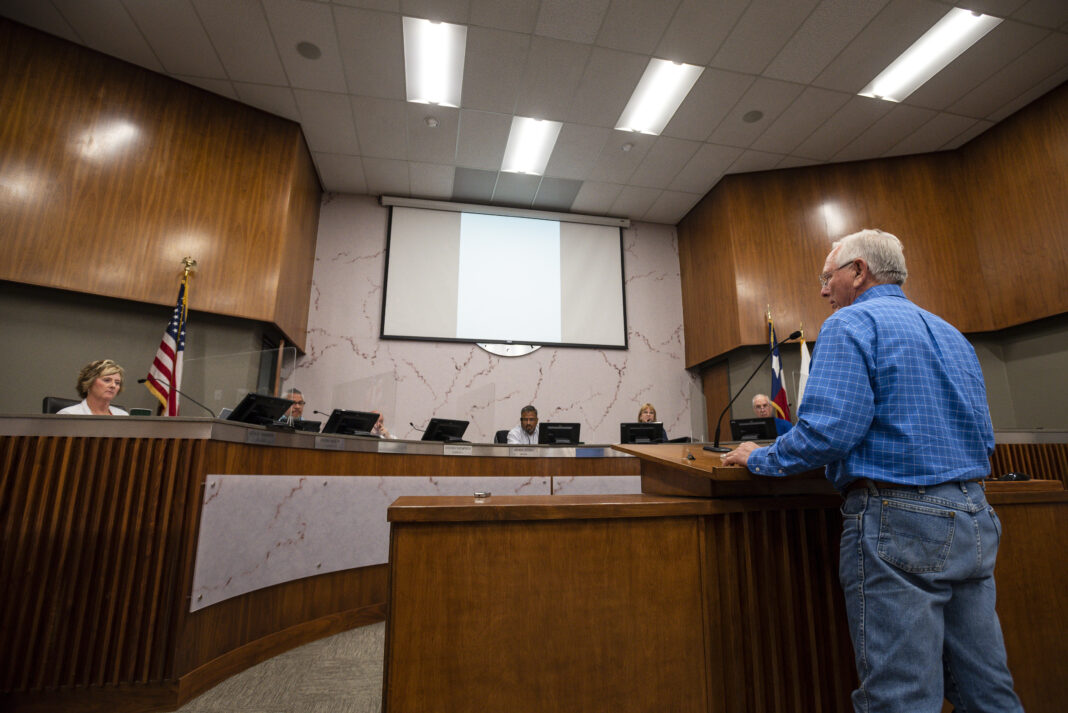Some Ector County Republican Party members are leading a petition drive to have a proposed $95 million bond issue for rehabilitation of the current water treatment plant placed on a future ballot.
The petition drive was launched after council voted 4-3 to use a certificates of obligation issue to pay for the water treatment project. Certificates of obligation require only a vote by council.
But longtime West Texas water expert Tommy Ervin says some petition supporters are muddying the waters by spreading half-truths and outright inaccurate information about the water plant project. During a recent phone interview Ervin, the Ector County Utility District president, asked for an opportunity to set the record straight.
Q: Is the water treatment plant in any danger of breaking down and leaving Odessa residents without water?
Ervin: “Yes. It’s an old and aging facility. You can only take care of it so long.
“If it crashes, we’ll have to go days, maybe longer, without water in Odessa. It would be a mess.”
Ervin and city officials have said the plant, which is more than 60 years old, is in a fragile state and if not ‘grandfathered’ in, would no longer pass state inspection regulations.
Most of the plant’s equipment is so old that replacement parts are no longer manufactured and becoming harder to find, Ervin said. That makes it more difficult to run the plant efficiently.
Some of the electrical equipment is in such bad shape that when the humidity gets too high, electrical boxes shoot out sparks – a fire hazard – but employees still have to operate the equipment.
That’s not only dangerous to employees; it’s a danger to Odessa water users. For example, if there were an electrical fire at the plant it would have a domino effect – electrical wiring would need to be redone, damage to the computer system is likely, phone lines, electric lines, light switches, the gears – it would all be affected.
“One emergency can close a plant for several days.”
The city earlier this year was very close to losing its water, Ervin said.
“In February during the freeze, the station was running on generators because the city had the foresight, but it was scary. The demand in water increased from 17 million gallons per day to 24. The demand was caused because people were asked to leave their water on to keep pipes from freezing and then we discovered many water leaks.
“The plant was huffing and puffing to get the job done, and it did. But it might not next time.
“If we see another freeze in 2022 the system might crash; if we see another freeze 2023, it might crash; if we see a freeze in 2024 – do you see the gamble we’re taking? Every year we wait the gamble becomes bigger.
“Is it an emergency? Tommy Ervin says yes.”
Q: Do you support a certificate of obligation or a public vote on the bond?
Ervin: “We’re gambling by asking people to vote on something they don’t know anything about. A big majority of people in the city have no idea what’s going on in the plant. All they see is $95 million.”
“If we have a (community) vote that will set us back until May 2022,” said Ervin, noting that would be the earliest the bond could be placed on a ballot. The cost of an election would cost taxpayers more than $100,000, Mayor Javier Joven has said.
“All of city council has had an opportunity to tour the water treatment plant. They know what kind of condition it’s in. I don’t understand their reasoning for their no vote.”
Council members Tom Sprawls, Mari Willis, Detra White and Steve Thompson voted in favor of using CO’s to pay for the water treatment rehabilitation during council’s June 8 meeting. Mayor Javier Joven and council members Denise Swanner and Mark Matta voted against.
Q: Why is the city using an Arizona-based engineering firm to oversee the water treatment plant rehabilitation project instead of a local company?
Ervin: “You can call any engineering company around here – Midland, Abilene – they will tell you they don’t have the expertise to do a project like this. You need experts and this company (Carollo Engineers) is one of the best.”
Ervin said two weeks ago, an oilfield worker suggested during a council meeting that oilfield engineers could tackle the project more efficiently and for less money.
“He doesn’t know what he’s talking about. We’re talking about a water treatment plant, not an oilfield. A water treatment plant is much more complicated and different than what they do in the oilfield.”
Q: The city has two water plants, why can’t we just continue using the second water plant if the first plant goes down?
Ervin: “When you take a plant down it’s a logistics issue. You have a million tons of water moving. You can’t just turn it off with a turn of a valve. The cost is massive.”
Both water treatment plants are about 60 years old and in deteriorating condition, Ervin said. If rehabilitation of plant #2 does eventually proceed, the city will have to spend millions shoring up plant #1 to make sure it can handle the additional load while the other plant is shut down and worked on.
“We’re not looking at reverse osmosis. We’re looking at a plant that needs to clean up major debris and pollution.
“We’re trying to get sticks and hair out of there; swim suits, boat gasoline residue, pee, poop, beer, dead fish and snakes gets pulled into these big pump stations – you need to clean that up.
“It costs money to clean. In my opinion, $95 million is a small price to pay for clean, usable water.”




